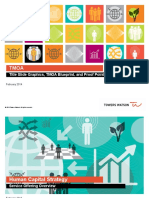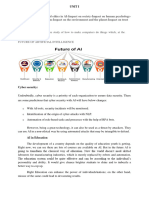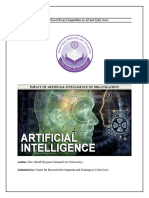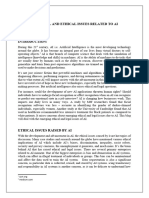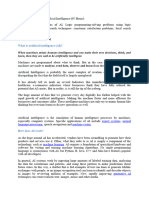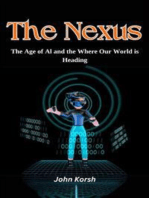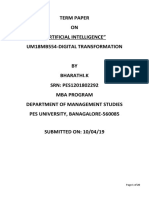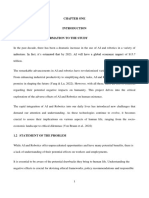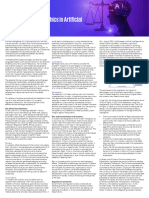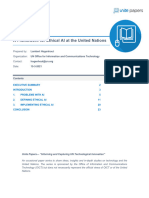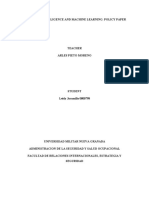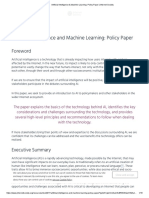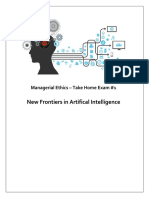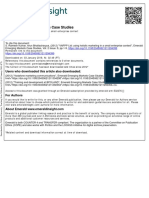Top 10 Principles: For Ethical Artificial Intelligence
Top 10 Principles: For Ethical Artificial Intelligence
Uploaded by
ChalermpongIntaratCopyright:
Available Formats
Top 10 Principles: For Ethical Artificial Intelligence
Top 10 Principles: For Ethical Artificial Intelligence
Uploaded by
ChalermpongIntaratOriginal Title
Copyright
Available Formats
Share this document
Did you find this document useful?
Is this content inappropriate?
Copyright:
Available Formats
Top 10 Principles: For Ethical Artificial Intelligence
Top 10 Principles: For Ethical Artificial Intelligence
Uploaded by
ChalermpongIntaratCopyright:
Available Formats
TOP 10 PRINCIPLES
FOR ETHICAL ARTIFICIAL
INTELLIGENCE
About UNI Global Union
UNI Global Union, based in Nyon, Switzerland, represents more
than 20 million workers from over 150 countries in the fastest
growing sectors in the world – skills and services. The Future
World of Work has been one of UNI Global Union’s key priorities
in recent years. With a leading voice on the global political and
industrial stage, UNI seeks innovative policies and partnerships
to ensure an empowering digital future for all. With an urgency
of now, UNI calls on all companies and governments to engage
with the union movement, to co-create a just transition to a
future of decent work. From the design of new technologies, AI
and algorithms, to the impact on the end-user, ethical and social
considerations must be made that put people and planet first.
UNI Global Union www.uniglobalunion.org
8-10 Av Reverdil www.thefutureworldofwork.org
1260 Nyon
Switzerland
TA B L E O F C O N T E N T S
4 Introduction
5 AI and The World of Work
6 Demand That AI Systems
Must Be Transparent
7 Equip AI Systems With an
“Ethical Black Box”
7 Make AI Serve People and Planet
8 Adopt a Human-In-Command
Approach
8 Ensure a Genderless,
Unbiased AI
8 Share The Benefits of AI Systems
8 Secure a Just Transition and
Ensuring Support for Fundamental
Freedoms and Rights
9 Establish Global Governance
Mechanism
9 Ban the Attribution of Responsibility
to Robots
9 Ban AI Arms Race
Introduction
A
s Artificial intelligence (AI), robotics, data and machine learning enter our
workplaces across the world displacing and disrupting workers and jobs,
unions must get involved. This document provides unions, shop stewards
and workers with a set of concrete demands to the transparency, and application
of AI. It will inform AI designers and management of the importance of worker
inclusion. There is a definite urgency of now. Action is required to safeguard workers’
interests and maintain a healthy balance of power in workplaces. The 10 principles
provided in this document are developed by UNI Global Union for this purpose.
AI is present in many household appliances and workplaces: in chatbots, robots, system analytics
and databases churning out information and reactions such as movements and speech. It has
usefully been defined by Arvind Narayanan, Princeton University, as “When behaviour comes
not purely from the programmer, but some other means, e.g. knowledge bases.”
Data is the building blocks of AI; sometimes simple data algorithms, but increasingly also more
complex threads of multiple datasets combined into every longer code.
TOP 10 PRINCIPLES FOR ETHICAL ARTIFICIAL INTELLIGENCE 04
Artificial intelligence is not a new phenomenon. It has been around for 40 or even 50 years.
But the rise of digital technologies, and the vast amount of data produced each day by you
and me, has given AI a new significance and a whole new dimension: machine learning.
Machine learning is an application of artificial intelligence (AI) that provides systems the ability
to automatically learn and improve from experience without being explicitly programmed.
Machine learning focuses on the development of computer programs that can access data and
use it to learn for themselves.
Hence, we now have forms of added intelligence that can self-learn. In a never-ending spiraling
learning process, what started as data derived from all of us, where humans tell the computer
that an image portrays a road sign, a cancer cell, a person or car, the machines – based on
previous information – can figure that out themselves. They too can find complex correlations
between data sets. One such example is that researchers with AI as a tool have now found
the seven conditions that need to be in a person’s life, for that person later in life to develop a
depression.
AI and The World of Work
AI and its applications are already displacing workers, and with the rapid development in its
capabilities, it is expected that many more tasks done by humans today, will be done by AI and
robots in the future. Within companies, typical human resource tasks are being complemented
or even substituted by AI. This can be seen in the use of AI in recruitment and promotion
processes, and in workplace monitoring and efficiency/productivity tests. Precisely because of
this, unions must be involved in understanding AI, its potentials and challenges to the world of
work, and push to have influence over its application.
“
Artificial intelligence must put people and planet first.
This is why ethical AI discussions on a global scale are
essential. A global convention on ethical AI that encompasses
all is the most viable guarantee for human survival.
“
Some workers are already losing their jobs to AI; indeed, research indicates that over 50% of the
work currently done by humans can be faster and more efficiently done by automated systems.
AI, machine learning, robotics and automated systems can also benefit workers. In the
healthcare sector, robots will be able to help workers lift patients, or monitor their wellbeing.
In many service jobs, AI systems can improve the service offered to customers as ever-growing
TOP 10 PRINCIPLES FOR ETHICAL ARTIFICIAL INTELLIGENCE 05
databases of information can support the worker in offering the right service and giving the
correct information.
For AI and all its applications to be implemented in a sustainable and ethical way, trade unions
must call for insights, influence and rights in relation to the management decisions based fully,
or partially, on AI. Across the world only a few company agreements currently exist that include
these workers’ rights.
Experts agree that now is the time to discuss and determine the appropriate use of AI. UNI
Global Union has called for a global convention on ethical AI that will help address, and
work to prevent, the unintended negative consequences of AI while accentuating its benefits to
workers and society. We underline that humans and corporations are the responsible agents.
This document operationalises UNI Global Union’s key demand: Artificial intelligence must
put people and planet first. This is why ethical AI discussions on a global scale are essential. A
global convention on ethical AI that encompasses all is the most viable guarantee for human
survival.
The following offers 10 principles and specific points of action, which unions, shop stewards
and global alliances must implement in collective agreements, global framework agreements
and multinational alliances. Taking this action will ensure workers’ rights and influence in the
age of digitalisation.
1. Demand That AI Systems Are Transparent
A transparent artificial intelligence system is one in which it is possible to discover how, and
why, the system made a decision, or in the case of a robot, acted the way it did.
In particular:
A- We stress that open source code is neither necessary nor sufficient for transparency –
clarity cannot be obfuscated by complexity.
B- For users, transparency is important because it builds trust in, and understanding of,
the system, by providing a simple way for the user to understand what the system is
doing and why.
C- For validation and certification of an AI system, transparency is important because it
exposes the system’s processes for scrutiny.
D- If accidents occur, the AI will need to be transparent and accountable to an accident
investigator, so the internal process that led to the accident can be understood.
TOP 10 PRINCIPLES FOR ETHICAL ARTIFICIAL INTELLIGENCE 06
E- Workers must have the right to demand transparency in the decisions and outcomes of
AI systems as well as the underlying algorithms (see principle 4 below). This includes
the right to appeal decisions made by AI/algorithms, and having it reviewed by a
human being.
F- Workers must be consulted on AI systems’ implementation, development and
deployment.
G- Following an accident, judges, juries, lawyers, and expert witnesses involved in the
trial process require transparency and accountability to inform evidence and decision-
making.
The principle of transparency is a prerequisite for ascertaining that the remaining principles
are observed.
See Principle 2 below for operational solution.
2 . Equip AI Systems With an “Ethical Black Box”
Full transparency in an AI system should be facilitated by the presence of a device that can
record information about said system in the form of an “ethical black box” that not only contains
relevant data to ensure transparency and accountability of a system, but also includes clear data
and information on the ethical considerations built into said system.
Applied to robots, the ethical black box would record all decisions, its bases for decision-
making, movements, and sensory data for its robot host. The data provided by the black box
could also assist robots in explaining their actions in language human users can understand,
fostering better relationships and improving the user experience. The read out of the ethical
black box should be uncomplicated and fast.
3 . Make AI Serve People and Planet
This includes codes of ethics for the development, application and use of AI so that throughout
their entire operational process, AI systems remain compatible and increase the principles of
human dignity, integrity, freedom, privacy and cultural and gender diversity, as well as with
fundamental human rights.
In addition, AI systems must protect and even improve our planet’s ecosystems and biodiversity.
TOP 10 PRINCIPLES FOR ETHICAL ARTIFICIAL INTELLIGENCE 07
4 . Adopt a Human-In-Command Approach
An absolute precondition is that the development of AI must be responsible, safe and useful,
where machines maintain the legal status of tools, and legal persons retain control over, and
responsibility for, these machines at all times.
This entails that AI systems should be designed and operated to comply with existing law,
including privacy. Workers should have the right to access, manage and control the data AI
systems generate, given said systems’ power to analyse and utilize that data (See principle 1 in
“Top 10 principles for workers’ data privacy and protection”). Workers must also have the ‘right
of explanation’ when AI systems are used in human-resource procedures, such as recruitment,
promotion or dismissal.
5 . Ensure a Genderless, Unbiased AI
In the design and maintenance of AI, it is vital that the system is controlled for negative or
harmful human-bias, and that any bias—be it gender, race, sexual orientation, age, etc.—is
identified and is not propagated by the system.
6 . Share the Benefits of AI Systems
AI technologies should benefit and empower as many people as possible. The economic
prosperity created by AI should be distributed broadly and equally, to benefit all of humanity.
Global as well as national policies aimed at bridging the economic, technological and social
digital divide are therefore necessary.
7. Secure a Just Transition and Ensuring
Support for Fundamental Freedoms and Rights
As AI systems develop and augmented realities are formed, workers and work tasks will be
displaced. To ensure a just transition, as well as sustainable future developments, it is vital
that corporate policies are put in place that ensure corporate accountability in relation to this
displacement, such as retraining programmes and job change possibilities. Governmental
measures to help displaced workers retrain and find new employment are additionally required.
AI systems coupled with the wider transition to the digital economy will require that workers
TOP 10 PRINCIPLES FOR ETHICAL ARTIFICIAL INTELLIGENCE 08
on all levels and in all occupations have access to social security and to continuous lifelong
learning to remain employable. It is the responsibility of states and companies to find solutions
that provide all workers, in all forms of work, the right to and access to both.
In addition, in a world where the casualisation or individualisation of work is rising, all workers
in all forms of work must have the same, strong social and fundamental rights. All AI systems
must include a check and balance on whether its deployment and augmentation go hand in
hand with workers’ rights as laid out in human right laws, ILO conventions and collective
agreements. An algorithm “8798” reflecting the core ILO conventions 87 and 98 that is built
into the system could serve that very purpose. Upon failure, the system must be shut down.
8. Establish Global Governance Mechanisms
UNI recommends the establishment of multi-stakeholder Decent Work and Ethical AI governance
bodies on global and regional levels. The bodies should include AI designers, manufacturers,
owners, developers, researchers, employers, lawyers, CSOs and trade unions. Whistleblowing
mechanisms and monitoring procedures to ensure the transition to, and implementation of,
ethical AI must be established. The bodies should be granted the competence to recommend
compliance processes and procedures.
9 . Ban the Attribution of Responsibility to Robots
Robots should be designed and operated as far as is practicable to comply with existing laws,
fundamental rights and freedoms, including privacy. This is linked to the question of legal
responsibility. In line with Bryson et al 2011, UNI Global Union asserts that legal responsibility
for a robot should be attributed to a person. Robots are not responsible parties under the law.
10 . Ban AI Arms Race
Lethal autonomous weapons, including cyber warfare, should be banned.
TOP 10 PRINCIPLES FOR ETHICAL ARTIFICIAL INTELLIGENCE 09
Sources:
This document has drawn inspiration and insights from the following key documents:
Joanna J. Bryson (2017) The meaning of the EPSRC principles of robotics, Connection Science,
29:2, 130-136, DOI: 10.1080/09540091.2017.1313817 http://dx.doi.org/10.1080/09540091
.2017.1313817
Boden, M., Bryson, J., Caldwell, D., Dautenhahn, K., Edwards, L., Kember, S., . . . Winfield, A.
(2011, April). Principles of Robotics. The United Kingdom’s Engineering and Physical Sciences
Research Council (EPSRC). (Web publication).
http://uk.businessinsider.com/stephen-hawking-elon-musk-backed-asimolar-ai-princi-
ples-for-artificial-intelligence-2017-2
https://www.epsrc.ac.uk/research/ourportfolio/themes/engineering/activities/principlesof-
robotics/
http://www.eesc.europa.eu/?i=portal.en.int-opinions.40538https://standards.ieee.org/devel-
op/indconn/ec/autonomous_systems.html
https://futurism.com/experts-want-robots-to-have-an-ethical-black-box-that-explains-their-deci-
sion-making/
TOP 10 PRINCIPLES FOR ETHICAL ARTIFICIAL INTELLIGENCE 10
You might also like
- Reviews On Preliminary Report On The First Draft of The Recommendation On The Ethics of Artificial IntelligenceDocument4 pagesReviews On Preliminary Report On The First Draft of The Recommendation On The Ethics of Artificial IntelligencePratyusha MondalNo ratings yet
- MODULE 3 - Chapter 6 (Trade Protectionism) PDFDocument7 pagesMODULE 3 - Chapter 6 (Trade Protectionism) PDFAangela Del Rosario CorpuzNo ratings yet
- Management by Filipino Values: Reference Book: Management by Culture By: F. Lando JocanoDocument13 pagesManagement by Filipino Values: Reference Book: Management by Culture By: F. Lando JocanoJiezl Abellano Afinidad100% (2)
- TMOA Style Guide 2-24-2014Document35 pagesTMOA Style Guide 2-24-2014Elif CakirNo ratings yet
- CCS345-Unit IDocument10 pagesCCS345-Unit IKathir VNo ratings yet
- AI Revolutio SSDD NDocument3 pagesAI Revolutio SSDD NSamuel Ivan NganNo ratings yet
- Ai Essay 18Document15 pagesAi Essay 18Dev ShroffNo ratings yet
- Emerging Legal and Ethical Issues Related To AiDocument3 pagesEmerging Legal and Ethical Issues Related To Aibgunjan2004No ratings yet
- RewriteDocument4 pagesRewriteOchiengNo ratings yet
- Evolution_of_Artificial_Intelligence_and_SocietyDocument5 pagesEvolution_of_Artificial_Intelligence_and_Societyanuragsenapati48No ratings yet
- Artificial IntelligenceDocument8 pagesArtificial IntelligenceJohn DoeNo ratings yet
- AI SINAV GüncelllDocument9 pagesAI SINAV GüncelllFurkan ÖzcanNo ratings yet
- Unit I Introduction To Artificial IntelligenceDocument11 pagesUnit I Introduction To Artificial IntelligenceSE10SAKSHI CHAVANNo ratings yet
- The Impact Of Artificial Intelligence The Rise of the Machines:From EverandThe Impact Of Artificial Intelligence The Rise of the Machines:No ratings yet
- Navigating the Ethical Landscape of AI: Privacy, Case Studies, and Best PracticesFrom EverandNavigating the Ethical Landscape of AI: Privacy, Case Studies, and Best PracticesNo ratings yet
- The Ethical Implications of Artificial Intelligence in Daily LifeDocument2 pagesThe Ethical Implications of Artificial Intelligence in Daily Lifedragonguy6622No ratings yet
- Formal Paper 2Document4 pagesFormal Paper 2tutorearnestNo ratings yet
- Artificial Intelligece DT Term Paper FinalDocument20 pagesArtificial Intelligece DT Term Paper FinalNagaraj DPNo ratings yet
- Introduction To Artificial IntelligenceDocument9 pagesIntroduction To Artificial IntelligenceLittle NerdNo ratings yet
- Chapter One To FiveDocument26 pagesChapter One To Fivebamideleopeyemi2003No ratings yet
- Ethics in Artificial IntelligenceDocument2 pagesEthics in Artificial Intelligencejolamo1122916No ratings yet
- IJRTI2304061Document5 pagesIJRTI2304061glensingh2020No ratings yet
- Introduction To AI and LawDocument5 pagesIntroduction To AI and Lawarnav.devgan31No ratings yet
- Unit 1 Notes Ccs345 Ethics &aiDocument23 pagesUnit 1 Notes Ccs345 Ethics &aihemalatha.mano2017No ratings yet
- AI Principles WEC AI Code of Conduct March 2023Document2 pagesAI Principles WEC AI Code of Conduct March 2023kartikinspirationsNo ratings yet
- Weef2017 Bueno HoeschlDocument7 pagesWeef2017 Bueno HoeschlDaniela MeloNo ratings yet
- Ansh Garala - 0008Document8 pagesAnsh Garala - 0008anshgaralaNo ratings yet
- Navigating the Ethical Landscape of AI: A Guide for Technology CEOsFrom EverandNavigating the Ethical Landscape of AI: A Guide for Technology CEOsNo ratings yet
- Artificial Inte-WPS OfficeDocument6 pagesArtificial Inte-WPS OfficemarialoreenpatenoNo ratings yet
- The Ethical Implications of Artificial Intelligence in SocietyDocument2 pagesThe Ethical Implications of Artificial Intelligence in Societybe10253.19No ratings yet
- AI OverviewDocument5 pagesAI OverviewGonzalo LopezNo ratings yet
- AI SINAV GüncelllDocument9 pagesAI SINAV GüncelllFurkan ÖzcanNo ratings yet
- The Moral Code of Machines: Exploring Ethics in AI and Machine LearningFrom EverandThe Moral Code of Machines: Exploring Ethics in AI and Machine LearningNo ratings yet
- Artificial IntelligenceDocument2 pagesArtificial IntelligenceEnrik ShenepremteNo ratings yet
- Ujwal BhattaraiDocument10 pagesUjwal Bhattaraibrishav59No ratings yet
- Unite Paper - Ethical Ai at The UnDocument23 pagesUnite Paper - Ethical Ai at The UnMouni SheoranNo ratings yet
- Practice, Available atDocument30 pagesPractice, Available atkrisNo ratings yet
- ESIAI -Unit 2Document19 pagesESIAI -Unit 2r3tvluckyNo ratings yet
- Artificial IntelligenceDocument5 pagesArtificial IntelligenceRafael FlorezNo ratings yet
- AIDocument2 pagesAIFilipa AntunesNo ratings yet
- Labor Law AssignmentDocument10 pagesLabor Law Assignmenttc58researcher11No ratings yet
- Artificial IntelligenceDocument4 pagesArtificial Intelligencesrsc sNo ratings yet
- The Ethical Implications of Artificial IntelligenceDocument3 pagesThe Ethical Implications of Artificial Intelligencemarvin aquino100% (1)
- Outline KATDocument6 pagesOutline KATZairene Jalipa Solover'zNo ratings yet
- Ethical Consideration in AIDocument4 pagesEthical Consideration in AIwajahat.zaman45No ratings yet
- Building Trust in AIDocument9 pagesBuilding Trust in AIJones DevereauxNo ratings yet
- Artificial Intelligence Applications 2023Document50 pagesArtificial Intelligence Applications 20231ankur.yadavNo ratings yet
- Generative AI - Position Statement - August 2023Document40 pagesGenerative AI - Position Statement - August 2023unixsamNo ratings yet
- Whitepaper Outline 7.28Document3 pagesWhitepaper Outline 7.28cute biterNo ratings yet
- Discurso SilviaDocument4 pagesDiscurso SilviaSilvia Ruiz AlmarzaNo ratings yet
- Artificial Intelligence 1695526138Document17 pagesArtificial Intelligence 1695526138Gabriela SánchezNo ratings yet
- Ethical Considerations in Artificial Intelligence Navigating The Moral LandscapeDocument2 pagesEthical Considerations in Artificial Intelligence Navigating The Moral LandscapeHealthy TipsNo ratings yet
- Artificial Intelligence & Machine Learning - Policy Paper - Internet SocietyDocument16 pagesArtificial Intelligence & Machine Learning - Policy Paper - Internet SocietymunirNo ratings yet
- New Frontiers in Artifical Intelligence: Managerial Ethics - Take Home Exam #1Document20 pagesNew Frontiers in Artifical Intelligence: Managerial Ethics - Take Home Exam #1Rajarshi KhasnabisNo ratings yet
- Ethical measurement in AI and how to avoid ethics-washingDocument9 pagesEthical measurement in AI and how to avoid ethics-washingMerlina TolevskaNo ratings yet
- Nitish Jha 2022BCH1001Document24 pagesNitish Jha 2022BCH1001Ayush SarafNo ratings yet
- The Ethics of Artificial IntelligenceDocument2 pagesThe Ethics of Artificial IntelligenceGalih PutraNo ratings yet
- Artificial Intelligence AssignmentDocument8 pagesArtificial Intelligence Assignmentataurrahmanshihab33No ratings yet
- Ethical Use of Artificial Intelligence (AI) in An OrganizationDocument4 pagesEthical Use of Artificial Intelligence (AI) in An OrganizationPeter KaranjaNo ratings yet
- Document 16Document3 pagesDocument 16almazanandrew2No ratings yet
- Fuel50 Capability Trends Report Generative AI Edition 2023 Q4 WebDocument12 pagesFuel50 Capability Trends Report Generative AI Edition 2023 Q4 WebRaúl GonzálezNo ratings yet
- Des MatienzoDocument3 pagesDes MatienzoDesiree MatienzoNo ratings yet
- Akbayan Vs Thomas Aquino DigestDocument2 pagesAkbayan Vs Thomas Aquino DigestAlvin MercaderoNo ratings yet
- A Project Report ON Strategic Purchasing Procedure, Systems and Policies (Hospital Industry)Document20 pagesA Project Report ON Strategic Purchasing Procedure, Systems and Policies (Hospital Industry)amitwin1983No ratings yet
- Assessing Process Maturity On ICFR - CMMDocument2 pagesAssessing Process Maturity On ICFR - CMMjramki100% (1)
- VNFPP LTD Using Holistic Marketing in A Small Enterprise ContextDocument10 pagesVNFPP LTD Using Holistic Marketing in A Small Enterprise ContextSeptian AdiNo ratings yet
- Strategy Formulation Process and Innovation Performance NexusDocument19 pagesStrategy Formulation Process and Innovation Performance NexusShafiq RehmanNo ratings yet
- MPU2223 3223 Course Guide (WM)Document6 pagesMPU2223 3223 Course Guide (WM)Nurul HanisNo ratings yet
- TiklosDocument2 pagesTiklosJokin KumoNo ratings yet
- List of Guiding Principles Promoting Good Governance in The Pharmaceutical SectorDocument8 pagesList of Guiding Principles Promoting Good Governance in The Pharmaceutical SectorSergey EremeevNo ratings yet
- DLL Emz 2Document7 pagesDLL Emz 2Rendon AndrinoNo ratings yet
- The ExecutiveDocument14 pagesThe ExecutivePatricia James EstradaNo ratings yet
- Design 3 - 3. Prelim Major Plate ProblemDocument4 pagesDesign 3 - 3. Prelim Major Plate ProblemRose Celine Diaz100% (2)
- Agri 78 - Weekly Home Learning PlanDocument7 pagesAgri 78 - Weekly Home Learning PlanPhoebe Jae100% (4)
- III.7 Corporate NationalityDocument12 pagesIII.7 Corporate Nationalitychristine jimenezNo ratings yet
- Zapin IntroductionDocument2 pagesZapin IntroductionEncik Amir Kamal0% (1)
- SampleDocument62 pagesSampleDivine Child Academy of Lawaan Eastern Samar Inc100% (1)
- Cur528 Week 6 Signature Assignement Week 2 Presentation Facilitator Skills Instruction MaterialsDocument9 pagesCur528 Week 6 Signature Assignement Week 2 Presentation Facilitator Skills Instruction Materialsapi-348608704No ratings yet
- Fanuc Pmc-Model Sa1/Sb7 Supplemental Programming Manual (LADDER Language)Document12 pagesFanuc Pmc-Model Sa1/Sb7 Supplemental Programming Manual (LADDER Language)mikeNo ratings yet
- CDIDocument14 pagesCDINicole PasiaNo ratings yet
- Assignment of Management Information SystemDocument3 pagesAssignment of Management Information Systemhyder imamNo ratings yet
- 4a 9390 Flashing Quick ReferenceDocument2 pages4a 9390 Flashing Quick ReferenceErnesto Lopez100% (1)
- Unit Aims: Basic CompetencesDocument20 pagesUnit Aims: Basic CompetencesjoséNo ratings yet
- Stenographer Recruitment (Adhoc Basis)Document4 pagesStenographer Recruitment (Adhoc Basis)Konathala BobbyNo ratings yet
- Assignment: Muslim Women (Protection of Rights On Marriage) Act, 2019Document8 pagesAssignment: Muslim Women (Protection of Rights On Marriage) Act, 2019Hari PriyaNo ratings yet
- Prof - Shikha Atri: International Finance Economics & Foreign ExchangeDocument28 pagesProf - Shikha Atri: International Finance Economics & Foreign ExchangecoolpalakNo ratings yet
- The Gifted and Talented Revised 1Document12 pagesThe Gifted and Talented Revised 1api-498575455No ratings yet
- Project Proposal: On Visual MerchandisingDocument12 pagesProject Proposal: On Visual Merchandisinganu poocheryNo ratings yet



